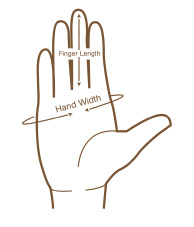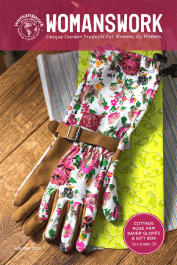designed for the way women work.
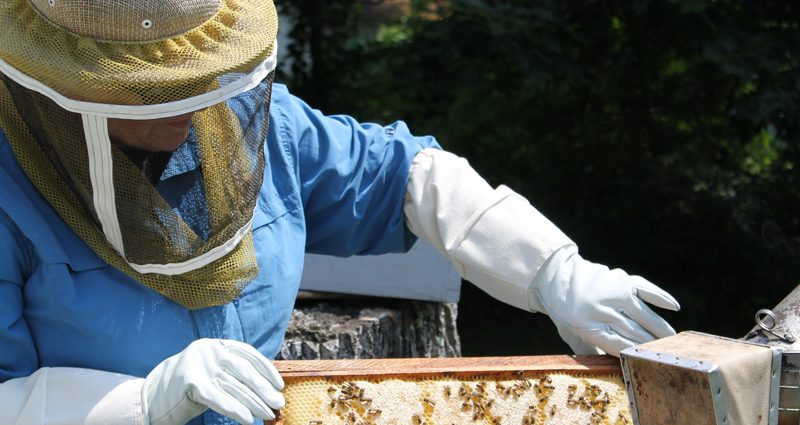
Interview with A Hobbyist Beekeeper
Category: Presenting "The Curious Gardener"

I met Michele Carlin this summer at the Pawling Farmers Market, the day she volunteered to talk to our community about beekeeping. As I watched the crowd gather around her I observed people’s curiosity about this age old art. In her talk Michele noted that honey is one of the few food products that doesn’t spoil. Local honey is a great remedy for colds and congestion.
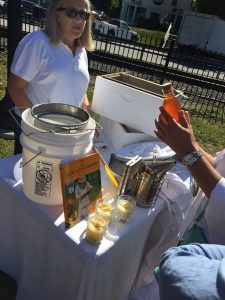
Michele is a math teacher at Trinity-Pawling School and she and her husband tend the beehives and teach T-P students the art and science of beekeeping. She loaned Womanswork her tools for our catalog shoot, and I interviewed her for this blog post.
DW: Where would I get bees if I want to start beekeeping?
MC: We found success with a local supplier of bees because the bees were acclimated to this area.
DW: How many bees would I need to get started?
MC: A “box” of bees comes with about 10,000 bees for every Queen bee. When you get your bees the Queen will be identified with a vegetable dye dot on her back.
DW: What are some of the amazing things you’ve learned about bees?
MC: They are truly civilized and organized. Each bee in a hive has a particular job to do. This is what keeps the whole colony in balance. For instance, there are guard bees whose job is to guard the entrance, and protect the Queen, in case an outsider bee tries to get in. Because the intruder from another hive or another species will have different pheromones than the bees living in that hive, the guard bees will know they don’t belong and will sting them to death.
Also, bees travel 15 mph, and they will travel 4 miles out from the hive and 4 miles back in a day. The drones bring pollen back to the hive and shake it off or rub it off. Then there are bees who never leave the hive, but whose job is to process the pollen. Other bees have the job of fertilizing the eggs that have been laid by the Queen, in the honeycomb built by yet another group of bees. It’s amazing how they all work together.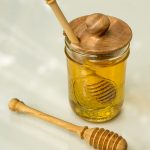
DW: How do you protect your hives from larger predators?
MC: We put straps around the stacks with rocks on top of them to dissuade small predators such as raccoons and squirrels. We also have black bears in our area and, despite common belief, bears do not go for the honey but they do go for the larvae. It has a sweet vanilla scent to it and it provides protein for the bears. Because of this threat, we are hoping to build a fence around our hives or at least enclose them in a large link dog kennel type situation. This is the only way to protect them from bears.
DW: How do you protect yourself?
MC: When you are working with the hives you need protection. I always wear my beekeeping hat with netting and I always wear leather gloves. I have a white beekeeping suit, of course, but I don’t always wear the suit. If you do get stung, it is important to wash the suit to remove the hormone that was excreted during the sting. It will upset the bees when they catch wind of it.
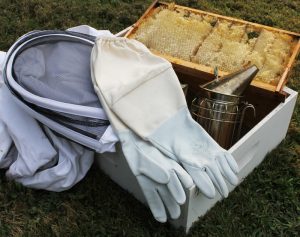
DW: What is the smoker used for?
MC: When you are going to open the boxes and handle the frames, you use the smoker to disorient the bees. If they cannot communicate with each other, they become still and that is the best scenario when you want to open the hive.
DW: How often do you need to check your hives?
MC: We check our hives about every other day, now that we know there are predators in the area.
DW: What do you do in the winter with your hives, living in a cold climate as you do? What happens to the bees?
MC: The hives are wrapped in insulation and tar paper for warmth but also prepared on the interior with cedar chips and screen for moisture wicking.
DW: What’s the best way to learn more about beekeeping?
MC: Join a beekeepers club. Read a good book about beekeeping. My husband and I found “The Backyard Beekeeper, An Absolute Beginner’s Guide To Keeping Bees in Your Yard and Garden” by Kim Flottum, to be the best source of information for us.
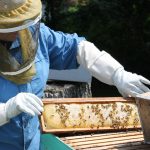
We also just joined a local beekeepers club in Beekman, NY. Our first club was in Weston, CT.

